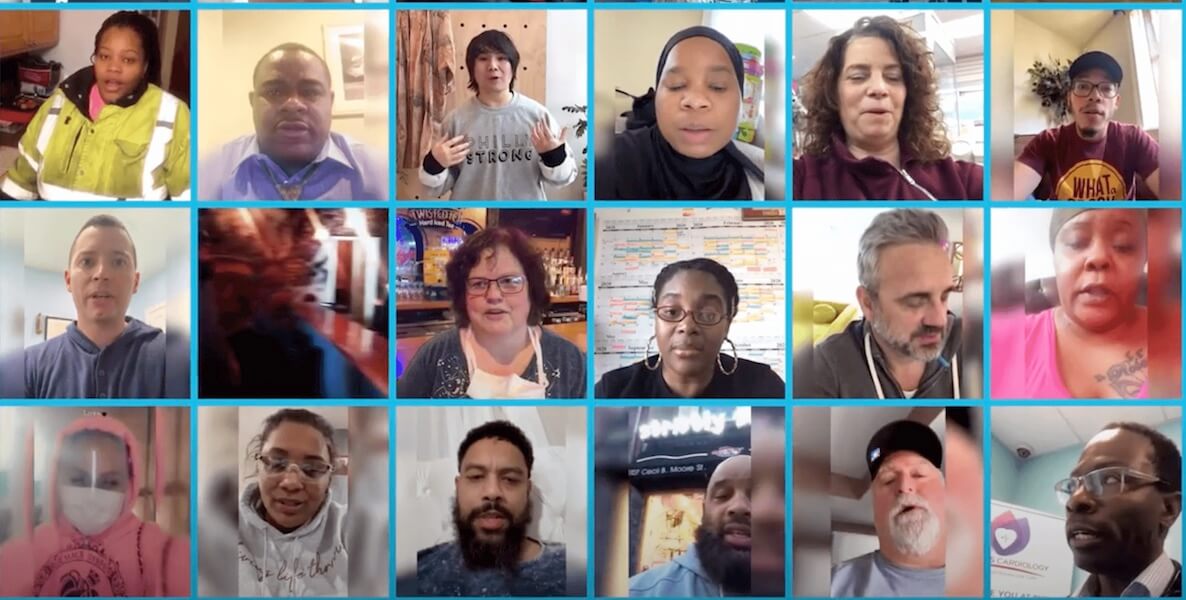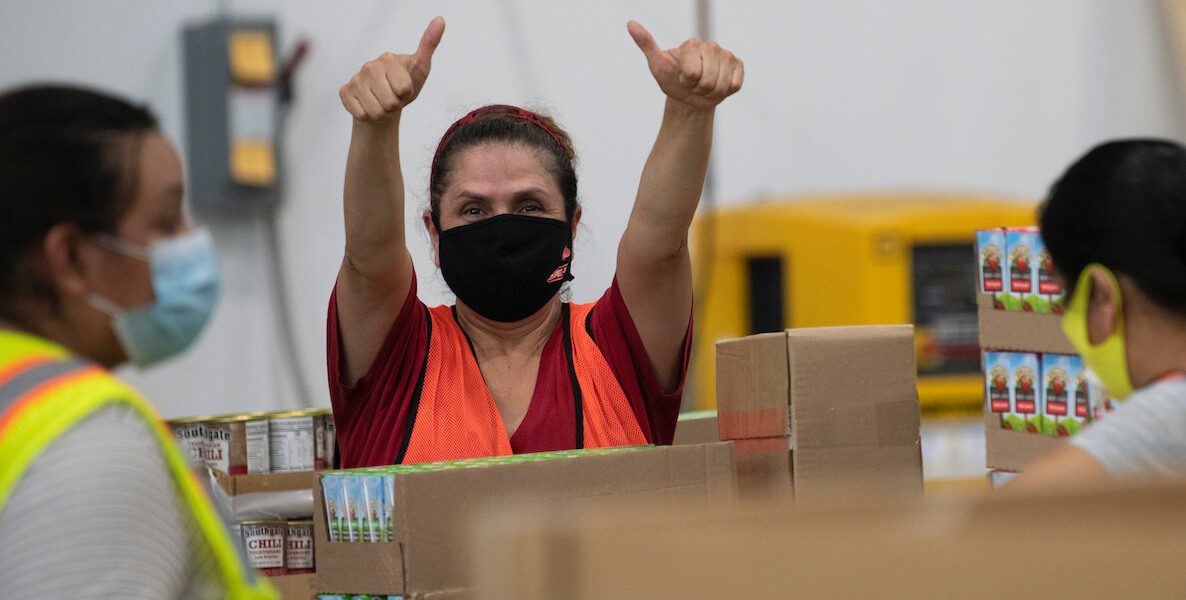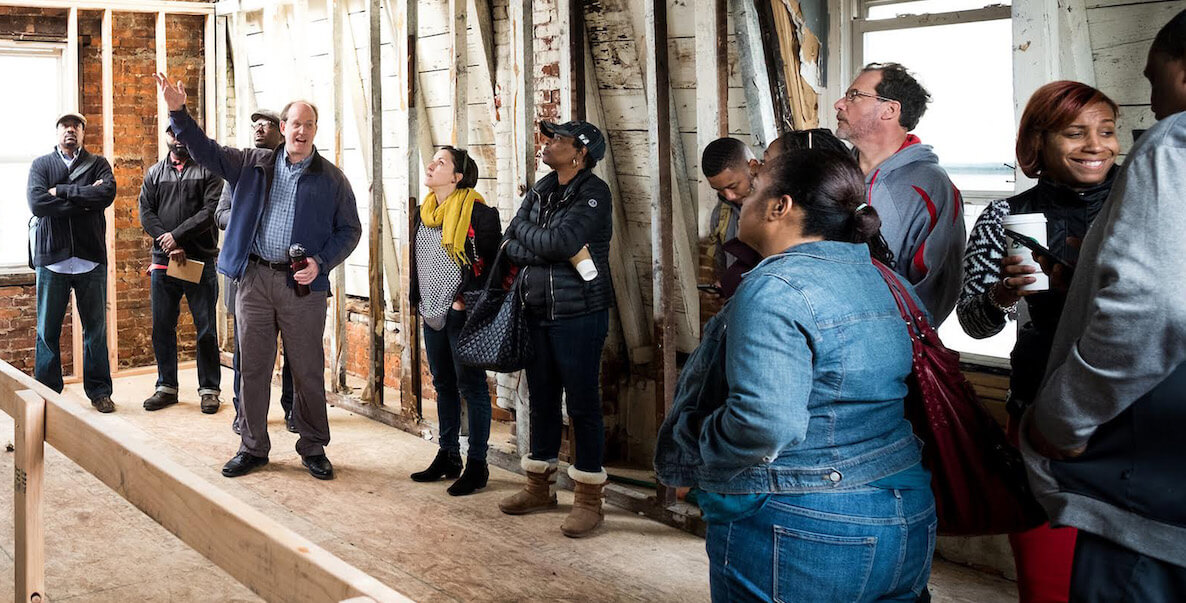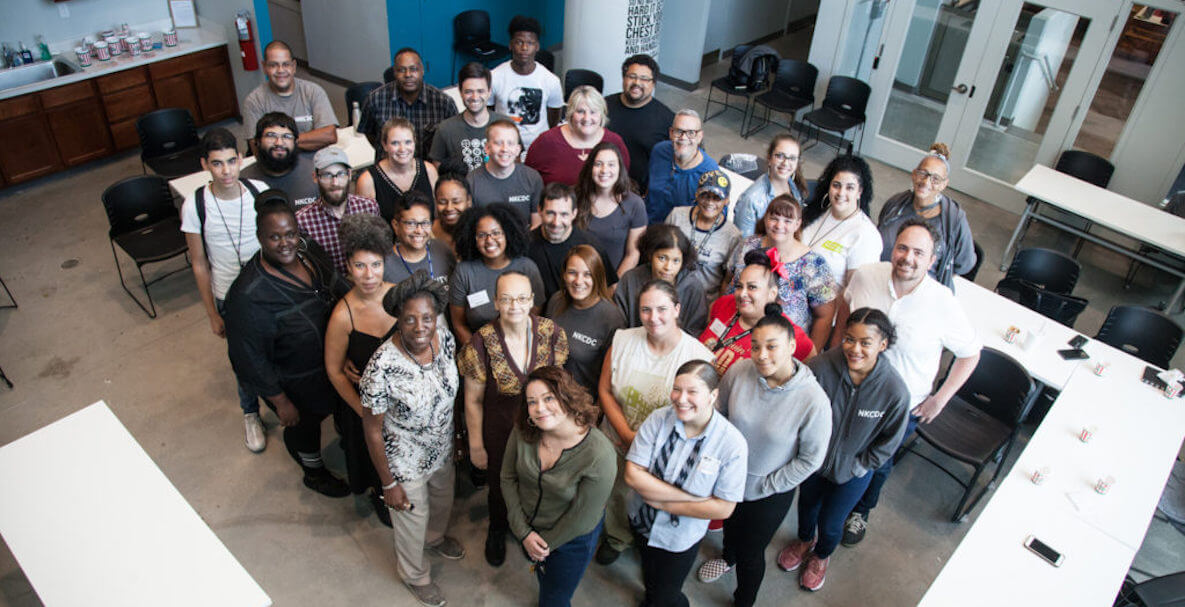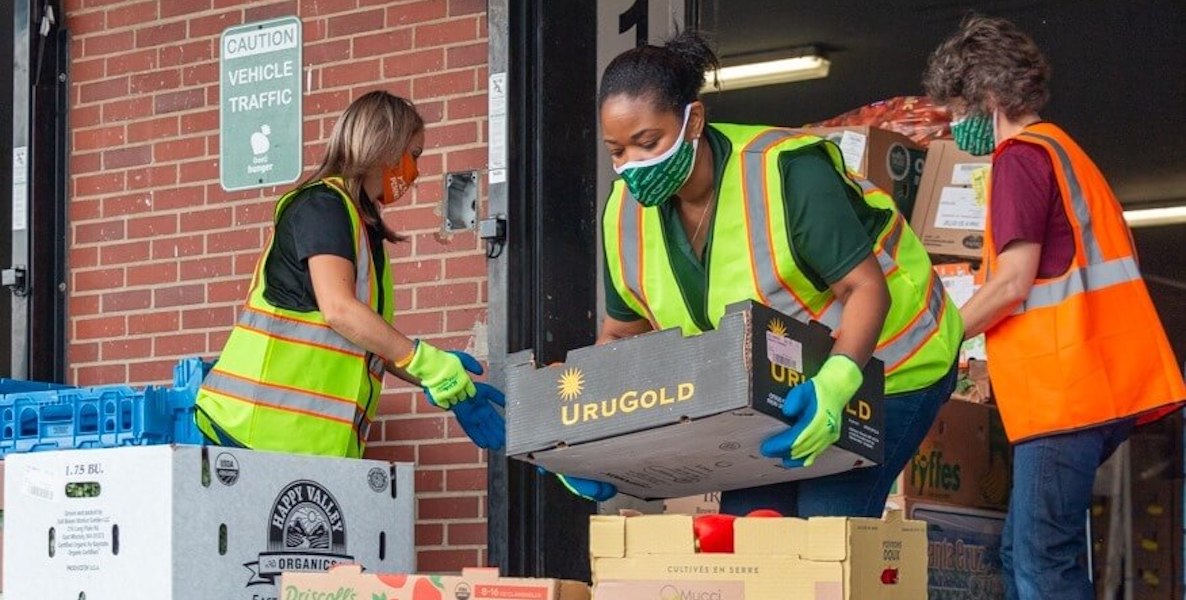Prior to the pandemic, Sulimay’s Restaurant in Fishtown, one of those comforting, diner-style neighborhood spots, was the kind of lively place where people would gather over eggs and kielbasa scrambles.
![]() Now, with foot traffic down throughout the city, the diner is limited to curbside pickup and has been selling sweatshirts and tote bags to help cover costs. Chad Todd, the restaurant’s owner, estimates that sales have been down 75 percent since the pandemic began.
Now, with foot traffic down throughout the city, the diner is limited to curbside pickup and has been selling sweatshirts and tote bags to help cover costs. Chad Todd, the restaurant’s owner, estimates that sales have been down 75 percent since the pandemic began.
Todd and his fiancée have been working seven days a week to try to keep the business afloat while also making meals for elderly people, other high-risk individuals in the area and those in need. They partnered with Penn Treaty Schools to provide meals and students and their families who had been affected by the shutdowns.
“When our dining room is open, it’s a melting pot. Everybody from all walks of life comes in for a meal,” Todd says. But, he says, “the government is failing the restaurant industry. Our biggest pandemic relief came from our own T-shirt sales and from people nominating us for the Leave Philly Alone shirts by True Hand Society. T-shirts and GoFundMe are not business plans.”
A citywide problem
Sulimay’s, of course, is not alone. Foot traffic has declined everywhere, and one report estimates that the Philadelphia area could lose more than 50,000 jobs as these already-low rates continue to decrease due to rising Covid-19 cases and colder weather.
Other small businesses simply haven’t been able to survive the financial hit: The number of small businesses in the city has already decreased 40.8 percent.
“When our dining room is open, it’s a melting pot. Everybody from all walks of life comes in for a meal,” Todd says. But, he says, “the government is failing the restaurant industry. Our biggest pandemic relief came from our own T-shirt sales and from people nominating us for the Leave Philly Alone shirts by True Hand Society. T-shirts and gofundme are not business plans.”
In November, the City distributed $30 million dollars in federal CARES Act funding to renters and small business owners in need of relief, but that amount doesn’t come close to the estimated $300 million that Philly’s small business owners need to continue.
But rather than let its neighborhood ecosystem crumble, the New Kensington Community Development Corporation (NKCDC) is rallying to support the community through meaningful initiatives. Founded in 1985, NKCDC works with businesses to support and revitalize businesses in the city’s Kensington, Fishtown and Port Richmond neighborhoods.
Past initiatives have included working with the Department of Commerce to help nearly 70 businesses in the area obtain security cameras for their storefronts, and helping businesses apply for storefront improvement grants.
Now, they’ve launched their new virtual holiday market, which the NKCDC will be holding throughout December, in lieu of their traditional in-person version.
In the coming months, NKCDC will also launch a small business emergency fund, to help provide further relief to the many mom-and-pop businesses that are floundering in the absence of substantial or sustained government aid.
Of the $522 billion given out in forgivable loans through the Paycheck Protection Program last spring, over half of the funds were distributed to larger businesses, including national chains. Only 28 percent of the funds were distributed in amounts less than $150,000, which is a metric the Small Business Administration uses to determine whether or not the loans are going to small businesses.
The small business emergency fund will aim to reduce the number of application steps and formalities businesses have to go through to get access to money, and to fill the gap that has been left by local and federal governments.
“With a lot of the programs that came out in the beginning of the pandemic there was just so much red tape involved with getting access,” says Jake Norton, co-manager of the economic development department at NKCDC. “Just running a pizza shop can be two or three full time jobs. So [owners] don’t have too much time to spend on trying to get through all the barriers to accessing funds that they desperately need.”
Supportive shopping
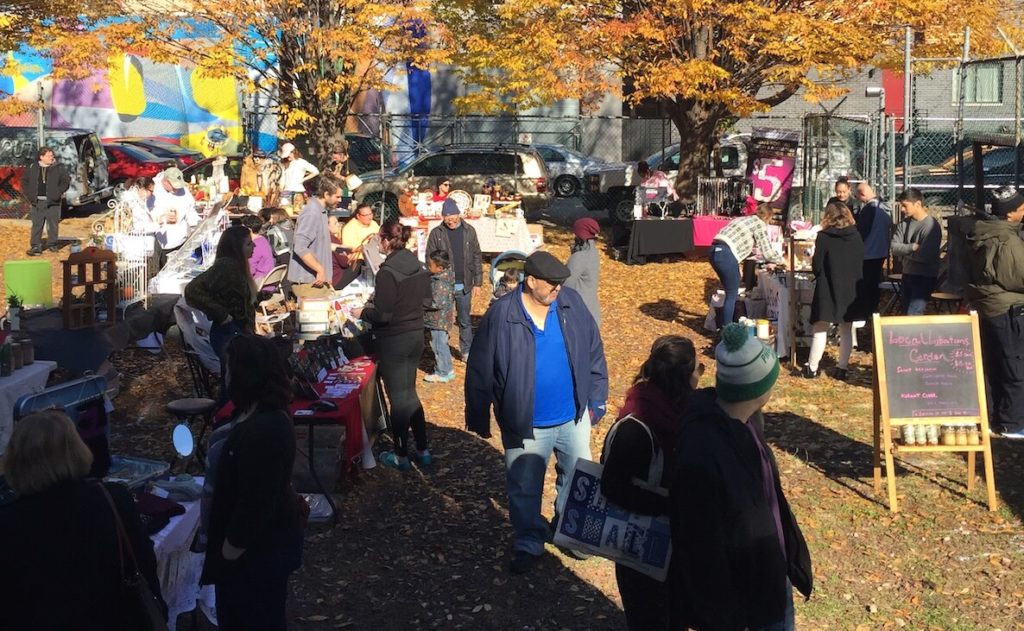
During non-Covid holiday seasons, Jessi Koch had always looked forward to visiting markets with her friends and family. She loved bonding with friends as they wandered through the stalls, discovering art, jewelry, and other unique vendors.
As a Philly native who has worked as a consultant for nonprofits, small businesses and artists in the city, the markets have always afforded her a fun way to support local entrepreneurs and makers. Now, in her current role as the co-manager of the economic development department at NKCDC, she’ll be meeting with her loved ones over Zoom to browse wares from over 50 local businesses.
The market’s website is divided into categories like clothing, art, jewelry and books, to help customers easily locate the type of gift they want to purchase. Customers are then redirected to individual vendors’ sites; if the businesses are happy with the increased traffic to their sites, NKCDC might keep the market going into the new year.
An in-person holiday market began a few years ago when NKCDC transitioned its garden center on Frankford Avenue into an event space.
Koch says that NKCDC suspected that they would have to transition the in-person market to virtual early on in the pandemic, and official plans for transitioning the market began two months ago.
“With the global pandemic, e-commerce is bigger than ever, especially for the entrepreneurs who are joining in on our holiday market and typically rely on vendor fairs,” Koch says.
Similar events aiming to drive traffic to or raise funds for city businesses have taken place in other neighborhoods this year. In September, Center City District held its third annual Shop Center City Saturday, to help drive traffic to retailers in the city’s downtown; in June, University City District held a raffle in lieu of its traditional Baltimore Avenue Dollar Stroll to support its small businesses.
“The community has wrapped its arms around us,” Cook says. “We are here because the community has shown that it values our bookshop.”
NKCDC’s virtual shopping event kicked off on Small Business Saturday on November 28th; whereas in previous years the market was solely a one-day event, this year’s virtual format has the silver lining of enabling NKCDC vendors to sell their wares for the entire month. And while in the past, NKCDC’s holiday market has focused on businesses from the city’s river wards, this year the virtual format will allow them to showcase shops from across the city.
“We have amazing businesses all over the place around the Kensington, Fishtown, Port Richmond area and we really wanted to highlight those. People can focus on helping out their neighbors,” says Norton.
A much-needed boost
![]() Jeannine A. Cook, owner of Harriett’s Bookshop in Fishtown, which opened in February of this year and will be participating in NKCDC’s virtual marketplace, says that all her business has ever known is Covid-19. Harriett’s has faced the dual challenge of navigating a business during a pandemic while also dealing with racist emails threatening violence toward Black business owners, their employees and their families.
Jeannine A. Cook, owner of Harriett’s Bookshop in Fishtown, which opened in February of this year and will be participating in NKCDC’s virtual marketplace, says that all her business has ever known is Covid-19. Harriett’s has faced the dual challenge of navigating a business during a pandemic while also dealing with racist emails threatening violence toward Black business owners, their employees and their families.
The business has persisted in both selling books and advocating for Black businesses and Black lives.
During the summer, Harriett’s moved its entire bookshop outside so that people could purchase books. Wearing a mask and carrying a backpack full of books, Cook has been passing out texts, including The Autobiography of Malcolm X: As Told to Alex Haley and Kate Clifford Larson’s Bound for the Promised Land: Harriet Tubman: Portrait of an American Hero to demonstrators at Black Lives Matter protests this summer.
The community, Cook says, is rallying around small businesses. Harriett’s held a Sisterhood Sit-in to celebrate its re-opening in October. The Afro-futurist event featured poetry, music and performance and asked attendees to consider themes of protecting and serving one another.
Harriett’s has donated 1,000 free books to organizers and essential workers, and they’ve raised funds for books as part of a book drive for St. Christopher’s Hospital.
Weckerly’s Ice Cream in Fishtown, which has worked with NKCDC on initiatives in the past, has partnered with several other small businesses in the city, including Lil Pop Shop and Triple Bottom Brewing, to create “Joy Boxes” of non-essential goods that can be delivered throughout the city. This summer, Weckerly’s partnered with Imperfect Produce to produce a plant-based ice cream and donated one-third of the money earned in sales of the flavor to The Fund for the School District of Philadelphia.
“That’s been a good way to bring in some revenue when otherwise we didn’t have many options. It’s also been a nice way to strengthen the bonds with other like-minded local businesses,” says Andrew Satinsky, Weckerly’s co-owner.
Small businesses in the river wards have been doing what they can to support each other and the community as well.
“The community has wrapped its arms around us,” Cook says. “We are here because the community has shown that it values our bookshop.”
Photo courtesy NKCDC



